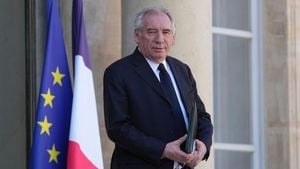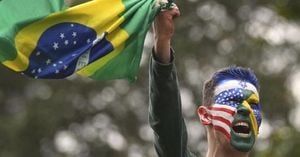Across the world, various countries have navigated relationships with China, and the dynamics play out significantly within educational spheres. Recently, Harrow School made headlines by becoming the first institution to open new branches within China after the Chinese Communist Party (CCP) rolled out its stringent 'patriotic' education regulations.
These educational laws target the curriculum, dictifying how subjects like history and culture should be taught. The move widely aims at instilling loyalty among students, ensuring they absorb values deemed necessary by the state.
The establishment of Harrow's school holds significant weight as it is their 13th franchise across Asia, indicating not only their expansion but the increasing interest from international schools to engage with the Chinese educational market. This trend raises questions about how foreign institutions adapt to stringent domestic policies.
China’s education overhaul manifests as part of broader efforts to mold the ideology of its youth, as highlighted by recent initiatives urging patriotic education across various sectors. With international schools adapting alongside these changes, it begs the question of how these institutions maintain their identity and curriculums under such regulations.
Harrow School's launch follows many previous expansions across Asia, showcasing the demand for British education abroad. Nonetheless, this growth is challenged by altering perceptions and governmental oversight, leading to debates about authenticity versus compliance.
China's push for educational control illustrates its ambition to refine its future generations from the ground up, using structured frameworks approved by the state. Critics argue this leads to homogenized educational experiences, potentially sacrificing individual creativity and critical thinking for conformity.
The educational dialogue creates friction between traditional educational values and the expectations enforced by the Chinese government. By implementing these laws, the CCP also demonstrates its vision for national identity forged through educational policies.
Existing tensions raise glares at whether international entities can maintain their essence or are compelled to conform wholly. The hardline stance from the CCP has been met with pushbacks, with educators and international bodies expressing concerns over academic freedom.
Educational institutions elsewhere have seen similar pressures, with countries wrestling with government mandates seeking to influence the content and approach within schools. Nonetheless, many institutions remain hopeful about collaborating adequately without compromising their foundational principles.
Looking at Harrow’s case provides insights not just about the institution itself, but also the broader tendency of educational institutions to navigate complex terrains across politically rich environments. Attention turns to how these schools will evolve under the new requirements, facing both opportunities and challenges.
Reports suggest families might be eager for their children to engage with internationally recognized schools. Harrow's entry underlines the growing demand for education reflecting Western ideals even amid stricter local governance.
Meanwhile, international relations and education intertwine as nations assess their diplomatic strategies through educational exchanges. The essence of education not only conveys knowledge but also builds bridges across cultural divides.
China’s increasingly influential policies combine with its global reach, shaping not only its educational framework but affecting countries worldwide as they prepare for interactions with emerging generations influenced by this narrative. The educational collaborations can serve as potential pathways toward diplomacy, signaling the subtle power of educational institutions.
Overall, Harrow’s new school reflects changing educational landscapes driven by government policies, global interests, and the pursuit of educational openness amid restrictive narratives.
Current global educational trends show institutions not shying away from the allure of foreign markets even with looming regulations. How well they adapt to present challenges would be pivotal, ushering new narratives around education, compliance, and resistance.
Harrow's presence makes it part of the conversation surrounding the influences affecting education, empowerment, and engagement. It opens dialogues on how future generations are taught, raising important questions about academic integrity and the nature of collectivism versus individualism.



